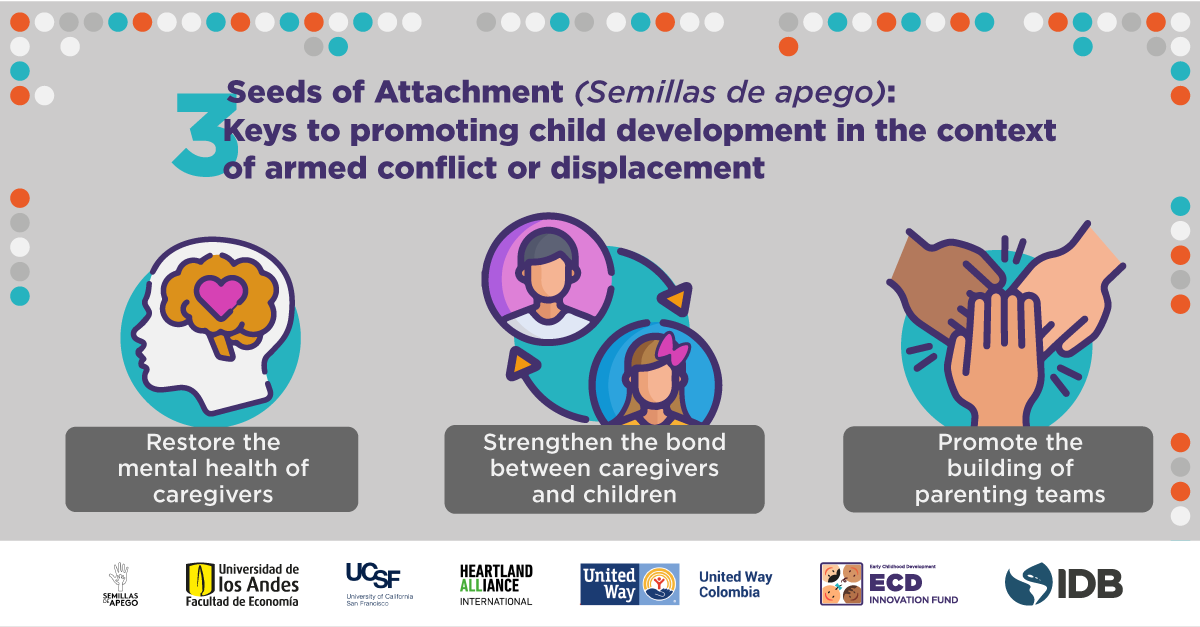The number is not trivial: 17% of the world’s children were living in conflict zones by the end of 2020. Exposure to traumatic events in the first years of life can make the stress response system to be active in a prolonged manner. This is known as toxic stress, and it affects children’s life trajectories. What challenges do we face in promoting child development in contexts of violence? What keys have we discovered to ensure it? The Seeds of Attachment (Semillas de apego) project sheds light on the subject.
It is a psychosocial accompaniment program for caregivers of children in early childhood living in contexts of armed conflict or displacement. It is currently implemented by community agents in four regions of Colombia affected by armed conflict or with high reception of displaced or migrant populations: Tumaco, Nariño; Jamundí, Valle del Cauca; and Barranquilla and Soledad, Atlántico.
These are the three project keys to promote child development in these contexts.
1. Restore the Mental Health of Caregivers
Most programs that promote early childhood development seek that caregivers understand why it is important to stimulate their children and how to do it, but they leave aside the caregiver’s emotional state, which is also affected by the context.
Mental health problems generate emotional numbness, which is the antithesis of secure attachment relationships. In contexts of armed conflict and displacement the incidence of mental health problems is high, which is why Seeds of Attachment (Semillas de apego) proposes to restore the mental health of caregivers by generating spaces that allow them to:
- Identify their personal strengths.
- Reflect on their capacity to assume and respond to the roles they have in their families and communities.
- Identify benevolent experiences from their childhood that give them strength to face day-to-day life and the upbringing of their sons and daughters.
- Recognize the impact that violent experiences have had on their lives and their capacity to be resilient in the face of these experiences.
2. Strengthen the Bond Between Caregivers and Children
When caregivers reflect on their life experiences, they can identify ways to build secure attachment with their children. An attachment that provides them with protection, security, trust and predictability. In this process of reflection, participants strengthen their ability to relate to children based on their stage of development and respond to their needs (for example, participants learn to identify that when their children say “no” or scream, it is not to make life difficult for their caregivers, but rather that these are behaviors that are part of their process of developing autonomy, especially from eighteen months to three years of age).
3. Promote the Building of Parenting Teams
Building parenting teams is important to prevent caregivers from becoming emotionally overwhelmed, so it is key for them to identify that there are other people involved in raising their children who give them peace of mind and confidence, and that they are not the only ones facing challenges in raising their children.
While having a parenting team (whether family members, friends, neighbors, or other people from the community) is relevant in all contexts, in ones of armed conflict and displacement it is necessary to address the issue closely because in these environments relationships and trust in others are often fragile. Through the group sessions organized by Seeds of Attachment (Semillas de apego), the idea that people are going through similar challenges and that caregivers are not alone in the process of involving more actors in the upbringing of their children is strengthened.
Currently, the Seeds of Attachment (Semillas de apego) project is working on training, monitoring and supervision mechanisms at the program scale based on technical knowledge and good practices identified by the IDB. In addition, with the support of the Early Childhood Development (ECD) Innovation Fund project network, it is working on improved versions of the model to achieve greater impact through strategic partnerships, such as the one with members of Sesame Workshop, who shared interactive materials as a tool to strengthen learning and bonding between caregivers and children.
This project was financed by the Early Childhood Development (ECD) Innovation Fund with the coordination of the Inter-American Development Bank (IDB), and the support of the FEMSA Foundation, the María Cecilia Souto Vidigal Foundation, Open Society Foundations, Porticus, and the Bernard van Leer Foundation. The Fund continues to work in the coming years with the firm purpose of innovating to achieve the quality of ECD services. To stay connected and learn more about this innovative work, we invite you to explore the Knowledge Hub on Early Childhood Development where you will find details of this and other projects, resources and useful information on ECD.


Leave a Reply